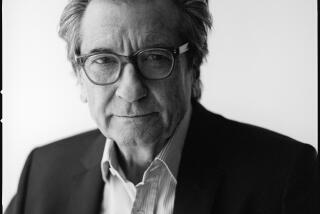Engaging ‘Bourne Ultimatum’ sets a frantic pace
- Share via
IT says something about Paul Greengrass’ directing style that he’s able to make a movie as fresh and frank as “The Bourne Ultimatum” from a genre as moldy and bombastic as the spy thriller, but it’s hard to explain what exactly, without inventing some new kind of frenetic, seen-from-all-angles-at-once Cubist grammar to describe it.
(Maybe. Something. Like. This! This. THIS!)
The third in a series kicked off by “Swingers” and “Go” director Doug Liman and now ably stewarded by Greengrass, director of the blood-chillingly understated “United 93,” the Bourne films are based on Robert Ludlum’s airport staple spy thrillers but ratcheted to a new level of excitement. Greengrass, clearly a philosophical type, is rarely content to show a thing from a single angle if he can show it from five. He wants us right in there, thinking on our toes and putting our heads together as if the life-threatening situation were our very own. He eliminates the polite distances between the movie and the viewer and shoves us into the chaos.
And yet the profusion of frantic shots never feels like showboating, and the closeness never feels claustrophobic. This is also saying something, considering how thoroughly action films have used similar techniques to come out resembling steroidal video games. Greengrass is not out to “entertain” in the dismal, specious sense. He can be trusted to never dangle a shiny Tom Cruise object in front of us and expect us to sit back in brain-dead amazement as it flies across a green screen just out of singe range of an exploding CGI fireball. Greengrass’ camera may scurry and dart like a rabbit trapped in a mall, but he keeps the tone grounded, the effects in-camera and the acting low-key and real. With plenty of help from director of photography Oliver Wood, screenwriters Tony Gilroy, Scott Z. Burns and George Nolfi and editor Christopher Rouse, Greengrass brings a degree of honesty to a completely implausible fantasy that’s remarkable.
Of course, Matt Damon helps too. Through his efforts, Jason Bourne, the fictional government-made killing machine we have followed through the two movies leading to this one (and would happily follow through a few more), stands out in a crowded field as the humblest and most relatable existentialist government-made killing machine ever devised. Even in the slightly more disillusioned spy subgenre, it’s rare to find a protagonist as soulful as Bourne. But a cosmopolitan polyglot with a brain, a conscience and no discernible attitude at all is not something you see on the screen every day. Of course, he can still kill an opponent with a ballpoint pen if it comes to that. He’s all purpose and no posturing -- the perfect antidote to the ugly American action hero.
Updated from Ludlum’s novels the better to align to post post-Cold War realities, the “Bourne” series takes our hero through three stages of enlightenment. In “The Bourne Identity,” he discovers who he is. In “The Bourne Supremacy,” he figures out who made him what he is, why they’re still out to get him, and gets back at them for killing his girlfriend. In “The Bourne Ultimatum,” he . . . looks deeper into the matter. This may not sound like much -- in fact, it’s not until after the movie has ended and someone asks you what it was about that you realize how disproportionate the frenzied action is to the story’s overall progress. Not that it really matters -- like the others, “The Bourne Ultimatum” is ultimately a movie about self-discovery. It moves fast but its real momentum is internal.
When we first meet up with Bourne, he’s in Moscow, where he had apologized to the orphaned daughter of the Russian politician he murdered on his first job. Ward Abbott (Brian Cox) is dead, and Pamela Landy (Joan Allen) has brought back the taped confession that should put an end to the Bourne manhunt. Soon, though, he discovers the rot had spread further than previously surmised. An article in a British newspaper suggests someone somewhere knows things about him he still doesn’t know but which his persistent flashbacks suggest he should look into.
Treadstone, the sinister secret program that created him and others like him, may be dead and buried along with its director, Abbott, but the umbrella operation that housed it is alive and well and being run by a shifty Department of Defense operative named Noah Vosen (David Strathairn). That Vosen is up to no good is clear even before he orders his hideously yuppie breakfast and condescends to Landy, the CIA operative who has started to develop protective instincts for lost killer-lamb Bourne. A man of his era, Vosen has taken what were once rogue black-ops more or less mainstream -- or at least as institutional as these things can get without being made public. As Bourne slowly remembers what was done to him and what he’s done, Landy and Nicky Parsons (Julia Stiles) start to question what they’ve been working for.
As fast-paced and far-flung as the previous films (Bourne and his various pursuers hop from Turin to Paris, London to New York, Madrid to Tangiers, staying barely long enough to get their fake passports stamped) and just as action-packed, “The Bourne Ultimatum” is in some ways the most psychological film of the three, reminiscent in some ways of “The Manchurian Candidate.” (The original, not the remake.) To what degree are our identities determined by conditioning? What happens to our sense of who we are when we start to question the motives of our leaders? Greengrass slips these questions in between bare-hands killings and motorcycle chases through the streets of Tangiers, where a fast thinker on the lam in an open-air market can improvise a bomb using only a can of hairspray and a kebab stand.
Damon lends an air of conscious integrity to the part, a quality of reflective introspection that acts as an amazingly effective ballast against the complete implausibility of his continued survival.
In other words, the series has always felt remarkably true-to-life for something as defiantly far-fetched. But as long as Damon keeps his focused intelligence and Greengrass continues to stay away from flaming CGI fireballs, Bourne will be able to continue to walk away unscathed from car crashes that could pulverize a rhino at half the speed with his credibility intact. They’ve earned it.
carina.chocano@latimes.com
“The Bourne Ultimatum.” MPAA rating: PG-13 for violence and intense sequences of action. Running time: 1 hour, 55 minutes. In wide release.
More to Read
The biggest entertainment stories
Get our big stories about Hollywood, film, television, music, arts, culture and more right in your inbox as soon as they publish.
You may occasionally receive promotional content from the Los Angeles Times.










